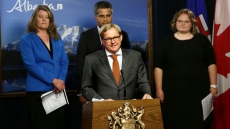REGINA — Religious leaders across Saskatchewan say doctors who don't want to help patients die shouldn't be forced to refer them to another physician who will.
Christian, Muslim and Jewish leaders met with Health Minister Dustin Duncan at the Saskatchewan legislature Tuesday and said facilities should not be forced to help people end their lives either.
Duncan said the province is looking at ways to accommodate those concerns about the new federal law that allows medical assisted dying.
The law says doctors can't be forced to provide the service.
But the College of Physicians and Surgeons of Saskatchewan policy also says they "must not abandon a patient who makes this request" and they need to arrange "timely access" to another physician or resources.
"We also feel that people do have a right to information," said Mary Deutscher, with the justice and peace commission of the Roman Catholic Diocese of Saskatoon.
"We have no problem with providing that information, but there's something different about a direct referral, that actually says that you need to find someone who will carry through on what we see as a very harmful action. Do you want to force doctors to have to harm people that they care for? And many of these doctors do see this as a harmful action."
Maj. Mike Hoeft with the Salvation Army said religious leaders hope that all health-care workers, including nurses and care aides, have a choice, too.
Hoeft said facilities should also be allowed to have a conscientious objection on assisted dying, noting that many are run by faith-based organizations.
"We as organizations would then be placed in the position of determining whether we abide by a regulation or whether we abide by the conscience and collective voice of our denominations," said Hoeft.
"The government can certainly impose upon facilities its will, but then the individual denominations would then need to determine whether they would continue to operate those facilities."

Duncan said the province could overrule the college policy on referrals, potentially through regulations or legislation, but that is yet to be determined.
He said the government is looking at other options, such as a registry of doctors willing to aid in dying that patients could access through the Ministry of Health, the college of physicians and surgeons or the Saskatchewan Medical Association.
"It's a bit of a distinction, but I know for a number of physicians, as well as other health providers, even the act of specifically referring an individual to another person, for many people was in a way taking part in the act of a physician-assisted death, and for some people that goes against their conscience," said Duncan.
Duncan said the religious leaders raised the possibility that faith-based organizations would "remove themselves from the delivery of health care" if facilities are forced to provide the service.
"That would be a concern," the health minister said.
"I think that faith-based organizations have provided great services for many years in Saskatchewan. They have a proud tradition and we certainly want to see them continue to provide services into the future."



